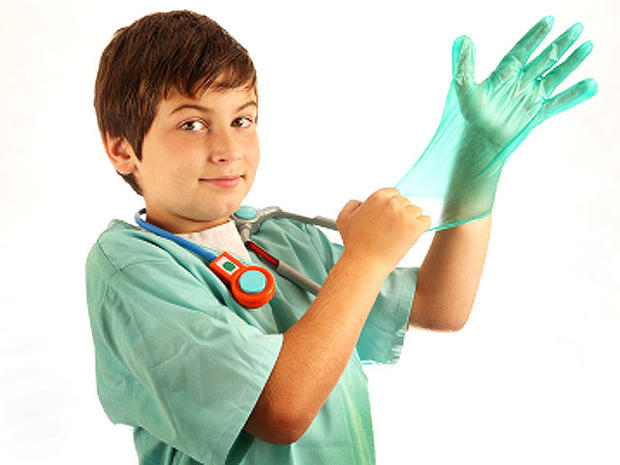Not so fast! 10 life-saving questions to ask your doctor
Can a few simple questions save your life? They can if you ask them of a doctor who is prescribing a drug or recommending a course of treatment.
Not sure what to ask, and under which circumstances? Here, with help from the Agency for Healthcare Research and Quality and Dr. Orly Avitzur, medical adviser at Consumer Reports, are 10 key questions patients should pose to their physicians...
What is the test for?
Diagnostic tests can be life-saving, but they can also be risky and can expose you to needless expense and worry - and sometimes even lead to a cascade of additional tests. So when a doctor says you need a particular test, ask why. Is the test really necessary? How will the results affect your care?
A recent survey of over 8,000 Consumer Reports subscribers showed that many underwent risky heart tests generally recommended only for people at very high risk for heart disease - even though their risk was low, most without getting more information from their physician or doing more research.
How many times have you done this procedure?
The adage "practice makes perfect" certainly applies to surgeons. Studies have shown that the more experience a surgeon has performing a particular procedure, the more likely he/she is to do it successfully.
One 2009 study showed that the risk of serious complications from gastric bypass surgery fell by 10 percent for every additional 10 cases per year the surgeon had performed. Another study of surgery for pancreatic cancer showed that the death rate among patients whose surgeons did the procedure infrequently was nearly four times higher than that of patients whose surgeons did the procedure frequently.
When will I get the results?
"It's astonishing how many of my patients assume no news is good news," Dr. Avitzur says. That's a mistake, because few doctors have a failsafe plan for making sure their patients are told the results of key tests. So make sure you know when to expect the results, and how they will be delivered (via a phone call, for example, or mail or during the next doctor visit).
Why do I need this treatment?
Some patients are too intimidated by their doctors to question their recommendations. Don't be one of them. If a doctor recommends a particular treatment, ask why. Do a little research on your own. If it seems there is a better option, bring it up with your doctor.
Are there any alternatives?
Just because your doctor recommends a particular course of treatment doesn't mean it's the best one. Pain, sleep difficulties, anxiety and other common problems for which doctors often prescribe medication can sometimes be treated just as effectively (and more safely and at lower cost) without drugs.
And many drugs can be reduced or discontinued if you follow lifestyle changes, such as eating a low-fat diet or losing weight. Worried about footing the bill for costly brand-name drugs? Ask the doctor if there is a less expensive generic.
What are the possible complications?
Headed to the hospital? You should know that hospital errors - including deadly ones - are surprisingly common. In fact, mistakes involving medication, surgery, and the like may be 10 times more common than previously believed, according to to new research by the University of Utah's Dr. David C. Classen.
The good news? Patients and their family members can greatly reduce the threat posed by hospital mistakes simply by speaking up.
Which hospital is best for my needs?
Need hospitalization? Sure, it's important to find out which nearby hospitals are listed as "in network" by your insurance plan. But it's also important to check hospitals' quality ratings - and to make sure your doctor or surgeon is on staff. Should you seek treatment at an academic medical center (teaching hospital) with special expertise? Or does a local community hospital have a good track record for treating patients with your problem?
How do you spell the name of that drug?
Drug mistakes are potentially deadly, and many drugs for very different problems have names that sound alike. For example, Celexa is an antidepressant while Celebrex is an arthritis drug. And those are just two of 1,500 commonly used medications that have names so similar to at least one other medication that they've already caused errors, according to a major study by the drug standards agency U.S. Pharmacopeia.
To lower your risk, always ask the doctor to spell the name of any drug he/she prescribes. Be sure to get both the brand name and the generic (chemical) name of the drug. And when you pick up your prescription, read the label carefully.
Are there any side effects?
This is a question that you should ask your doctor or pharmacist any time you get a new prescription. Knowing the potential side effects, both common and unusual, will help you assess the risks as well as the benefits - and prepare you to get prompt medical help in case you experience an untoward reaction.
Will this medicine interact with medicines that I already take?
Many drugs can interact harmfully with each other. For example, pain relievers such as aspirin, ibuprofen (Advil), and naproxen (Aleve) can blunt the effects of some blood pressure drugs. And the blood thinner warfarin (Coumadin) can interfere with common antibiotics.
And don't overlook possible interactions between drugs and herbal remedies. The herbal antidepressant St. John's wort, for instance, can render birth-control pills less effective. Review all of your medications with your doctor or pharmacist at least every six months. Your doctor or pharmacist can run a computerized drug-drug interaction checking program to pinpoint problems before they strike.
The right way to talk to your doctor
Your approach to these questions can make a difference. If you make it a challenge or sound hostile, your doctor may get offended. But if you phrase them positively and state that you want to be sure you understand and avoid calling in later, or be certain that you weigh your options correctly, most doctors will welcome the conversation. And if they don't, it's time to find a new doctor.











